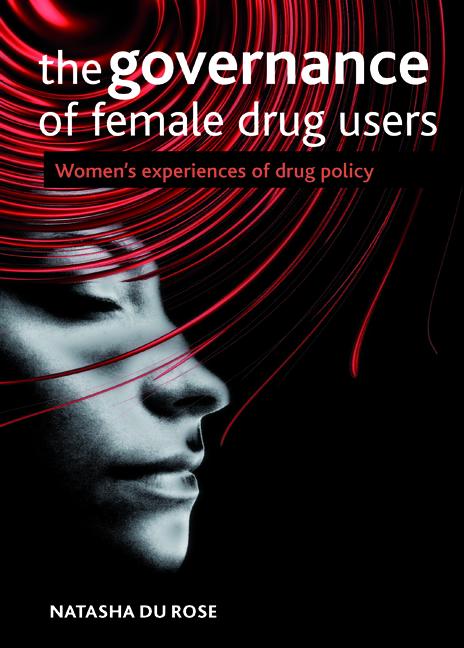Part Three
Published online by Cambridge University Press: 10 March 2022
Summary
This part of the book takes a case study approach, and analyses the impact of drug policy on the lives of 40 female drug users. Drug policy is articulated through technologies of power, the affects of which are explored through an examination of detailed life historical interviews focusing on how 40 female illicit drug users see themselves. The stories the women tell about their drug use, with a particular focus on the subject positions they adopt for themselves, are examined. The techniques of power, discussed in Part Two, are taken into account, but there is also a focus on how authoritative discourses shape women drug users’ identities by examining the key techniques of the self female users deploy managing their drug-using identities. These include the ascription of characteristics, normalisation and responsibilisation: female users are made visible, defined and categorised through the characteristics ascribed to them through ‘authoritative’ discourses; and they are also subject to normalisation and responsibilisation at the hands of the ‘authorities’. At the same time, the women negotiate alternative identities to those prescribed to them through policy discourse and in this sense their subjectivities serve as sites of resistance.
Technologies of the self
The official discourses of women's drug use not only govern their actual substance use through the governmental technologies of prohibition, medicalisation and welfarisation, but also shape and sustain their using identities. This is made possible through various technologies of the self that operate in the lives of the female users.
Foucault argues that technologies of the self exist in every civilization, and are ‘the means by which individuals determine their identity, maintain it or transform it’ (Foucault, 2000 [1969], p 87). He describes technologies of the self as:
… the techniques and procedures which permit individuals to effect by their own means, or with the help of others, a certain number of operations on their own bodies and souls, thoughts, conduct, and way of being, so as to transform themselves in order to attain a certain state of happiness, purity, wisdom, perfection, or immortality. (2000 [1982], p 225)
Part Two examined the technologies of power – prohibition, medicalisation and welfarisation – through which women users are governed. As discussed, these are technologies of domination or practices of power that ‘determine the conduct of individuals and submit them to certain ends’ (Foucault, 2000 [1982], p 225).
- Type
- Chapter
- Information
- The Governance of Female Drug UsersWomen's Experiences of Drug Policy, pp. 137 - 150Publisher: Bristol University PressPrint publication year: 2015

